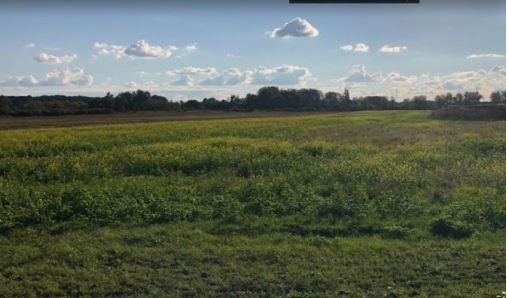Schmidt Péter, Young Farmer, Rábapatona
Success Story
The young farmer, who operates his farm on 90 ha, lives in Rábapatona in the Kisalföld. He learned the farming practices related to RA from the articles available on the Internet. He uses RA practices since 2015 in some of his areas, especially in field crop production (wild wheat, aspen barley, phacelia, sunflower, cabbage rape, corn, purple clover). The farm has 2 permanent and 10 seasonal employees. The latter are employed in the horticultural sector.
The main activity of the farm is growing field crops (wheat, barley, phacelia, sunflower, cabbage rape, corn, purple clover) and other vegetables and fruits: strawberries, cherries, pumpkins, sweet corn, sweet potatoes. In his economy, there are many crops and green manure crops, he likes to grow nitrogen-fixing plants (purple clover), he uses cover crops to preserve soil moisture, he turns the stem residues back into the soil to increase its organic matter content and improve its water retention capacity, and he also uses no-rotation tillage. These are all RA practices.
He started using these methods in order to increase the soil's organic matter content and water retention capacity. By turning the stem residues back and turning the green manure plants (cover plants) into the soil, the organic matter content in the soil increases. This is useful in several ways. It helps bind and retain water in the soil and increases microbial activity. Water and microbial activity are the keys to nutrient discovery processes, so plants will have access to the soil's macro- and microelement content. Tillage without rotation allows this microbial activity to be permanent in the soil.
As a result of RA, crop yields improve, soils cultivated in this way have better water balance, are easier to cultivate, and therefore use less fuel. Cost-effectiveness is not only good for the farmer, but also for the environment.
Among the obstacles and difficulties, he underlines the controversy that in some cases the use of cover crops leads to an increase in insect pests, primarily in rapeseed, which must be dealt with more intensive plant protection activities, but this is contrary to RA practices.
Overall, he is satisfied with the RA and will continue it in the future, as he sees its effect as favorable, but - as he mentions - these are long-term processes.
LABELS: Hungary, crop-production
|
GENERAL INFORMATION |
|
Location of farm |
Hungary, Rábapatona |
|
Name of the farmer |
Schmidt Péter |
|
Size of farm |
90 ha |
|
Permanent staff |
2 |
|
Main products of farm |
Winter wheat, Winter barley, Phacelia, Sunflower, Cabbage rape, |
|
CURRENT REGENERATIVE AGRICULTURE PRACTICES ON THE FARM |
|
Farmland cultivated with RA practices |
Part of it: in some areas, especially in field crops |
|
Crops produced with RA practices |
Winter wheat, Winter barley, Phacelia, Sunflower, Cabbage rape, |
|
Duration of using RA practices |
Since 2015 |
Read more information in pdf...

The REGINA project (No. 2021-1-HU01-KA220-HED-000027629) was funded by the European Commission. The content of this website does not necessarily reflect the views of the European Commission.
Call 2021, KA220 – Cooperation Partnerships in Higher Education
The European Commission’s support for the production of the publications does not constitute an endorsement of the contents, which reflect the views only of the authors, and the Commission cannot be held responsible for any use which may be made of the information contained therein.


